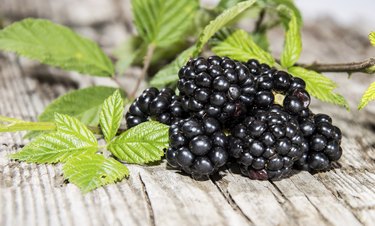
You may be familiar with the nutritional value of blackberries, but did you know blackberry leaves also have their own health benefits? Though not as widely known as a superfood, research shows they may offer medicinal value.
Tip
Blackberry leaves may be useful in treating acute diarrhea and a number of oral health issues.
Video of the Day
What Are Blackberry Leaves?
Blackberry leaves come from the blackberry plant, a perennial shrub native to every continent except Australia and Antarctica, according to Penn State University. Like strawberry leaves, they are thought to provide a number of health benefits.
Video of the Day
Blackberry leaves are a byproduct of berry cultivation, and though many focus on the berry itself, blackberry leaves can be made into a tea or included in poultices. According to Brandeis University's medicinal plants glossary, poultices are a soft material that is applied to the body to address inflammation and soreness. They are generally kept in place with a cloth.
The National Cancer Institute indicates herbal medicines such as blackberry leaves have a special status in Germany because of the Commission E. Commission E can be thought of as a U.S. Food and Drug Administration counterpart.
The American Botanical Council provides an online version of the Commission E Monographs, which indicates the commission approved blackberry leaf in February 1990. They recommend it as a treatment for nonspecific acute diarrhea, as well as mild inflammation of the mouth and throat. There are no contraindications, interactions with other drugs or known side effects.
Interestingly enough, neither raspberry leaf tea nor blueberry leaf tea is listed among the Commission E approved herbs.
Health Benefits of Blackberry Leaves
According to a July 2014 study published in Pharmacognosy Review, the blackberry plant is a good source of tannins, iron and vitamin C and other antioxidants. Specifically, blackberry leaves and roots have served as a remedy for diarrhea, regulating menses and anemia. A decoction of the leaves can be used to treat thrush and cleanse the mouth.
Commission E recommends a daily dose of 4.5 grams of the leaf or equivalent preparations. It's also approved for other preparations for internal use, as well as for mouthwashes. They recommend speaking with a doctor if diarrhea continues for more than three to four days.
A June 2016 in vitro and in vivo study in Antioxidants shows the main bioactive compounds in berries are also found in the leaves. Blackberry leaves are among the richest sources of chlorogenic acid. Though more research needs to be conducted using human subjects, the study indicated that they are rich sources of bioactive natural products with antioxidant, anti-inflammatory and antimicrobial properties.
Though raspberry leaf tea and blueberry leaf tea may present similar health benefits as their berries per the Antioxidants study, they shouldn't be used in place of blackberry tea as a treatment for any health condition.
Read more: Top 10 Healthiest Fruits and Vegetables
Making Blackberry Leaf Tea
A 1995 publication of the Missouri Department of Conservation says to make blackberry leaf tea using dried blackberry leaves. Crush the leaves and add a teaspoon or two of them, depending on how strong you want your tea, to a cup of boiling water. Cover and steep for at least three to four minutes. Strain the leaves out of the liquid. You may want to sweeten your tea with honey to combat the bitter taste.
The Missouri Department of Conversation also provides directions for making raspberry leaf tea. The department recommends avoiding the use of fresh raspberry leaves and instead opting for dried leaves mixed with lemon or orange peel to make your tea. Add a teaspoon of crushed leaves to a cup of boiling water and allow to steep for three to five minutes; then sweeten to taste as desired.
You can also make blueberry leaf tea this way. The amount of dried leaves and the length of time you steep them in boiling water affects the strength and flavor of the tea.
- Penn State University: "Blackberry"
- National Cancer Institute: "German Commission E"
- American Botanical Council: "Blackberry Leaf"
- Pharmacognosy Review: "Rubus fruticosus (Blackberry) Use as an Herbal Medicine"
- Antioxidants: "Berry Leaves: An Alternative Source of Bioactive Natural Products of Nutritional and Medicinal Value"
- Brandeis University: "Medicinal Plants of the Northeast Glossary: Poultice"
- Missouri Department of Conservation: "Wild Edibles of Missouri"
- The Nature Conservancy: "Winter Warmer: Make Tea From Local, Wild Plants"
- Medline Plus: Antioxidants